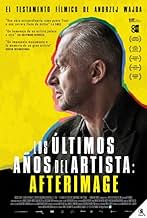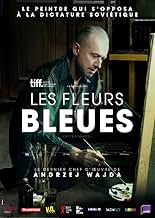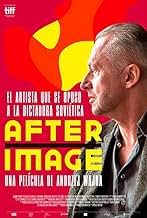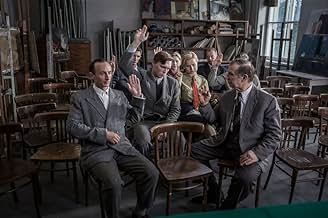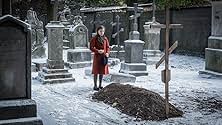Adicionar um enredo no seu idiomaThe story of charismatic painter Wladyslaw Strzeminski, who opposed social realism and maintained his own artistic freedom in spite of political obstacles.The story of charismatic painter Wladyslaw Strzeminski, who opposed social realism and maintained his own artistic freedom in spite of political obstacles.The story of charismatic painter Wladyslaw Strzeminski, who opposed social realism and maintained his own artistic freedom in spite of political obstacles.
- Direção
- Roteiristas
- Artistas
- Prêmios
- 2 vitórias e 12 indicações no total
- Direção
- Roteiristas
- Elenco e equipe completos
- Produção, bilheteria e muito mais no IMDbPro
Avaliações em destaque
The film is about the cruelty of the Stalinist period and how it intervened and interfered in the private lives of the common citizen and all the more so in the sphere of art, which "had to serve the people and the final victory of socialism". There are no throats being cut, people being shot or hanged. No spanking. Everything takes place in and "orderly way", for strict rules must be followed. Or perhaps only almost always! This reminds us of Kieslowski's film about killing or the thick atmosphere of Arthur Koestler's "Darkness at noon". Little by little art, i.e. the protagonist, is being suffocated. It is like cutting his veins, but not at once, slowly, in slow motion. Let him bleed to death, but "naturally". That was really a very hard time and Andrzej Wajda knows what he is talking about, for he experienced it "on his own skin", as you say in Polish. A symbolic image summarizes the pic: the window in the artist's dwelling is suddenly veiled by a red banner. A painter can somehow bear poverty, but can he survive without light? Brushes, paint? Wajda's choice of the actor (Boguslaw Linda) to embody Wladyslaw Strzeminski, one of the great Polish artists and art professors of that period, was fundamental to the artistic value of the picture. Bearing also in mind the fact that he had to play a cripple, who had lost two limbs, certainly made his acting even more daunting. And the outcome is certainly impressive.
Another factor that helps sooth the dreariness of the artist's predicaments is the strong presence of the teenager actress (Bronislawa Zamachowska) who plays his daughter. Her seemingly matter of fact reactions to reality and only rare expressions of deeper feelings function as a balance between the drama we witness and the everyday chores or the mere sipping of tea. "There are holes in my shoes" or "You smoke too much". His adoring students, on the other hand, may represent what was left of hope in those days. Their solidarity with the aging, crippled professor was an omen of better times to come, for who can defeat youth? And who can defeat art? The material shabbiness of those times, when "all were equal, but some were more equal than others", with food rationing, very poor dwellings etc. is shown in detail. Some viewers used to cinematic tangibility may not appreciate some of Wajda's discreet, very subtle hints and symbolic images, but, no doubt, in artistic terms this pic is a comeback to his heydays.
Rio Film Festival 8th October, 2016 Tomasz Lychowski
The sustained official campaign of death by a thousand cuts inflicted on Strzemiński strongly recalls that depicted in Wajda's earlier 'Rough Treatment' (1978), to which 'Afterimage' often feels like a prequel. The earlier film, however, was an angry, brutally contemporary film, while 'Afterimage' - while vividly conveying the Orwellian nightmare that was Stalinist Poland - is a much mellower piece recalling the far-off days of Wajda's youth with a grace and energy wholly belying his astonishing age; and Andrzej Mularczyk's script gleams throughout with flashes of wry black humour. The film has few out and out villains, with most of Strzemiński's persecutors sympathetic but powerless to resist.
The jagged widescreen photography of Pawel Edelman and design by Marek Warszewski simultaneously evoke the monochromatic drabness of life under communism while often looking vaguely expressionistic, with odd flashes of colour skilfully deployed. (A particular visual highlight is the priceless scene early on in which his studio is saturated with red light from a banner of Stalin erected directly outside his window, to which his already characteristic response is guaranteed to get him into trouble.)
Bogusław Linda's performance as Strzemiński would be impressive enough even without the remarkable technical feat he accomplishes of nipping about on crutches minus his left arm and left leg, while Bronislawa Zamachowska is tremendous as his equally resilient and bloody-minded daughter Nika; truly a chip off the old block.
It was crazy how they used the system to basically suppress him as the qualifications to work in his country were ridiculously and being crippled met that he did not meet enough standards to receive a stamp on his work Visa that said he could work as an artist. The art store would not even sell him paint if he did not have his work ID. So this guy wanted to work and was more than capable of being an artist despite his limitations, but they would not simply because his thoughts went against what was popular at the moment.
I find it interesting that movies about the events around World War II seem to be popping up a lot. My first thought was that people are getting tired of movies about Iraq or Afghanistan like possibly people got tired of the constant references of Vietnam in every 1980s TV show, but I'm starting to think that's not the case. Even though life in the present is no where near as hard as what they went through back then, I'm noticing some trends from yesteryear coming back into fashion and these movies are used to keep in are minds fresh the idea that those who do not know history are doom to repeat it.
I don't know if this story is based on truth, but it's definitely inspired by things that did happen, which makes it a very educational film, but at the same time it was very entertaining, with great acting and very good visuals. The relationship between the painter and his students was very colorful. Afterimage does a great job at hinting at things without hitting you over the head with it, which I liked.
Not what I was expecting when going to the theater, but well worth watching.
http://cinemagardens.com
In the very first scene, we see Strzeminski in a beautiful green meadow, teaching his pupils how to paint a landscape. When a new pupil presents herself, he literally rolls down the hillside to meet her - in spite of his disabilities: he misses one leg and one arm. Strzeminski is happy and upbeat. During the film, this proud man slowly transforms into a human wreck. At the end, he is no longer able to stand on his feet, let alone roll down a hillside.
Bit by bit, the communists make his life impossible. In a visually stunning scene, all light in his apartment turns red, because of a giant Stalin banner which is attached over his window. Furious, because he is no longer able to paint in natural daylight, he tears the banner with one of his crutches. It's the start of a fight against the system that turns out to be futile.
Director Andrzej Wajda, who died last year, shows Strzeminski as a man who lives for his art, and for nothing else. Even his teenage daughter is forced to move to an orphanage, because he doesn't seems to be interested in raising her. Wajda shows Strzeminski's weaknesses, but also his opponent's doubts. Many of them somehow sympathize with him, but are unable to show support without risking their own position. An example is the manager of the local museum, who cannot display his paintings, but carefully keeps them in storage.
Parallel with Strzeminski's decline, we witness also Poland's transformation from a proud nation into a Soviet-dominated satellite state, where communist propaganda is everywhere and the quality of life deteriorates rapidly. In one scene, Strzeminski is turned down by a shop selling painting materials, because his membership of the artist's union is withdrawn. He hides his disappointment and takes his daughter to the cinema. But there he finds out he has to watch Soviet propaganda. Disgusted, he leaves the theatre.
'After Image' shows an important episode of Poland's artistic history. At the same time, it is a warning against any totalitarianism, and an ode to artistic freedom.
Você sabia?
- CuriosidadesOfficial submission of Poland for the 'Best Foreign Language Film' category of the 89th Academy Awards in 2017.
- Citações
Wladyslaw Strzeminski: They praise the ones who suck up. They're silent about the real artists.
Julian Przybos: I spoke about this with Milosz. He also believes that an artist who can't speak with a full voice should be silent. Artists can be killed in two ways: either by talking about them too much or not at all.
- ConexõesReferences O Homem de Mármore (1977)
- Trilhas sonorasLandscape
Written by Andrzej Panufnik
Performed by Narodowa Orkiestra Symfoniczna Polskiego Radia w Katowicach
Conducted by Piotr Komorowski
Principais escolhas
- How long is Afterimage?Fornecido pela Alexa
Detalhes
Bilheteria
- Faturamento bruto nos EUA e Canadá
- US$ 33.443
- Fim de semana de estreia nos EUA e Canadá
- US$ 5.832
- 21 de mai. de 2017
- Faturamento bruto mundial
- US$ 1.032.768
- Tempo de duração
- 1 h 38 min(98 min)
- Cor
- Mixagem de som
- Proporção
- 2.35 : 1




